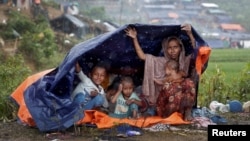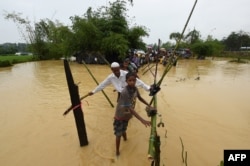U.N. aid agencies are stepping up preparations to protect hundreds of thousands of Rohingya refugees in Cox’s Bazar, Bangladesh, from the ravages of the impending monsoon season.
This is a race against time. The first of Bangladesh’s two cyclone seasons begins next month. Barely three months later, heavy monsoon rains will fall, bringing with them flooding and disease.
All of this spells bad news for some 688,000 Rohingya refugees who have fled to Cox’s Bazar, Bangladesh, since August to escape violence in neighboring Myanmar. They, along with more than 200,000 others who have arrived in earlier waves, are living in vulnerable, squalid, cramped settlements.
U.N. refugee spokesman Andrej Mahecic says families most at risk of floods and landslides are being encouraged to move to other areas. Because land is limited, he says priority will have to be given to those most at risk.
“Today, we are actually beginning to relocate the first 50 families living in one of the flood-prone areas to a new and safer part of the site. They will be among 381 households who have been identified and who will be relocated in the next week. Other families will be relocated by the IOM, the international Organization for Migration,” Mahecic said.
Another big fear, besides that of having their homes swept away, is the risk of waterborne diseases. The heavy monsoon rains and floods increase the likelihood of outbreaks of diarrhea and hepatitis, as well as diseases such as malaria and dengue.
The government of Bangladesh has given the World Health Organization and partners the go ahead to expand health services in the Rohingya settlements in preparation for the monsoons. WHO says it is coordinating with more than 100 partners and 270 health care facilities known to be operating across all camps and settlements.

